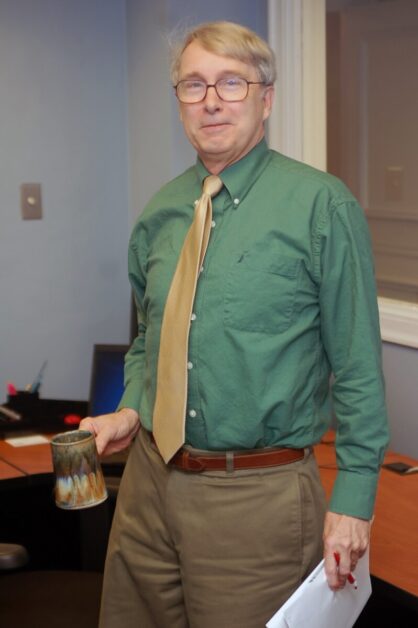By Scott Hinshaw
Coming at the end of our department’s fiftieth anniversary, I had a wonderful opportunity to interview Dr. William (Bill) K. Finley for the UNCG Institutional Memory Collection this spring. Dr. Finley is the former head of Special Collections and University Archives at UNCG, where he worked from 1998-2013. He is also Emeritus Faculty at UNCG.

During Bill’s time at UNCG the department underwent a great deal of growth. In personnel, scope and depth of collections, and in outreach to the larger campus, community, and donors, Bill’s leadership and knowledge helped to shape the direction of the department through the late nineties through early twenty-tens.
Over the course of the interview, Bill covers his early years growing up in Franklin, Virginia (one of the highlights of the interview is listening for Bill’s Tidewater Virginia accent) and attending Franklin High School. Bill also recounts the course of his education after high school. He attended the College of William and Mary for his BA in English, the University of Kentucky for his MA in English, Duke University for his PhD in English, and the University of South Carolina for his MLS degree.
Bill had joined the ROTC when he attended William and Mary but was fortunate to have his active duty service requirements reduced due to the winding down of the Vietnam War and an excess of officers in the military. After graduating from the University of Kentucky and serving his required active duty, Finley began his career in higher education teaching at Old Dominion University in 1970, where he taught for two years. Realizing he needed to get his PhD, Bill attended and taught at Duke University from 1973-1976. He next went on to teach at Concord College (now University) for 11 years (1976-1987), where he attained tenure, before deciding to make a shift in career.
After gaining his MLS degree from the University of South Carolina, Bill worked as an archivist at Beinecke Rare Book and Manuscript Library (Yale). Bill recalls being surprised after his initial interview at Yale, which he did not feel good about, that he was offered the job. He “had his bags packed and ready to go,” almost before he put the phone down. Bill stayed at Yale for 5 years (1988-1992), but wanted to be more involved with creating and assembling collections, so he moved on to the College of Charleston, where he served as Head of Special Collections from 1992-1998.
Bill arrived at UNCG in 1998 as Head of Special Collections and University Archives. Bill was quick to explain that he came to the department with it in a very good place due in large part to Emmy Mills, former department head, who had laid the groundwork for a successful future. The department started out very small relative to what it is today. Bill recalled the four employees in the department (Betty Carter, Carolyn Shankle, Linda Jacobson, and Janis Holder) and we discussed the changes in the department under his leadership, and in the library in general, as well as some of his favorite collections (woman’s collections – Girl’s books in series) and book (“the millionth volume” Book of Job by William Blake). There were vast changes in staffing and physical space during Bill’s time here. The department grew to 14 faculty and staff towards the end of his time at UNCG, and the department moved and shifted to eventually encompass the third floor of the Main Library.
Bill also mentions two particular areas of collection growth that expanded during his time here: Cello music manuscripts, and the Betty H. Carter Women Veterans Historical Project. He cites these two collections as examples of collection cultivation that happens organically. These are also both examples of the type of growth that both demands more resources (people and space) as well as encourages more widespread interest in our collections. Bill, characteristically, is quick to add that “My focus on being a head of the department was not a very good business model I know, but I never really saw universities as business. My idea was – get good people, stand back, and let them do their job and don’t micromanage things. Many of the new directions we took here didn’t come from Bill Finley, they came from other staff members or from without…”
I hope that everyone will take a moment to watch a portion, or all, of Bill’s oral history to learn more about the department and the man who guided it for 15 years. It was an absolute pleasure to talk with him and I enjoyed getting to know him better. I hope others will as well.
Watch the interview here: https://gateway.uncg.edu/islandora/object/oh%3A940